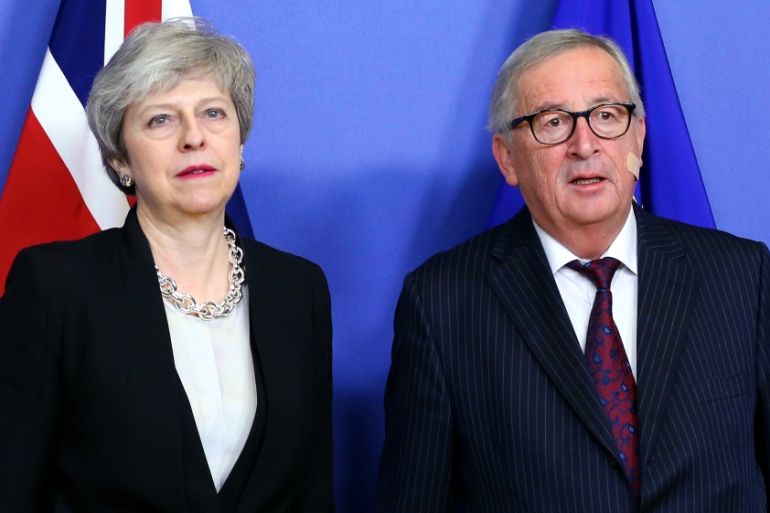Expect ‘no decision’ on Brexit at this week’s EU summit: Juncker
The comments from European Commission president comes amid reports UK PM will ask Brussels for a short delay to Brexit.

European Commission President Jean-Claude Juncker said it was unlikely the European Union would reach any decision on Brexit at this week’s summit in Brussels amid media reports that the United Kingdom will request a short delay to the EU divorce.
Pointing to the political turmoil in London over Britain’s plans to leave the EU, Juncker told German broadcaster Deutschlandfunk on Wednesday that the remaining 27 member states’ hands were tied until that was resolved.
Keep reading
list of 4 itemsNorthern Ireland agreement could end deadlock, restore government
Forced to become British: How Brexit created a new European diaspora
Number of Britons regretting Brexit hits new record high: Survey
“As long as we don’t know what Britain could say yes to, no decision can be taken on our side either,” he said.
“There will be no renegotiations, no new negotiations, no additional guarantees in addition to those already given,” Juncker added. “We have intensively moved towards Britain, there can be no more.”
His comments came on the same day the BBC revealed that British Prime Minister Theresa May will ask Brussels for a short delay to Brexit.
With legislators deadlocked over the way forward on Britain’s 2016 referendum decision to leave the EU – scheduled to take effect in just nine days – May will ask for a short delay, the BBC reported.
“PM won’t be asking for a long extension,” it quoted a Downing Street official as saying on the eve of a summit with EU leaders in Brussels.
“There is a case for giving parliament a bit more time to agree [on] a way forward, but the people of this country have been waiting nearly three years now.
“They are fed up with parliament’s failure to take a decision and the PM shares their frustration.”
Fears of an economic shock
Exasperated European leaders are demanding London tell them clearly what it wants, warning that the risk still remains that Britain could crash out of the bloc on March 29, ending its 46-year membership without formal arrangements.
The British prime minister is struggling to keep control of the Brexit process after MPs last week decisively rejected the EU divorce deal for a second time.
She has reluctantly accepted that Brexit must be postponed, amid fears of an economic shock if Britain ends its membership of the EU with no new arrangements in place.
In the 2016 referendum, 17.4 million voters, or 52 percent, backed Brexit while 16.1 million, or 48 percent, backed staying in the bloc that the UK joined in 1973.
The vote and a series of political crises since have exposed deep divisions and has fuelled soul-searching about everything from secession and immigration to capitalism and British identity.
The crisis has left allies and investors puzzled by a country that for decades seemed a confident pillar of Western economic and political stability.